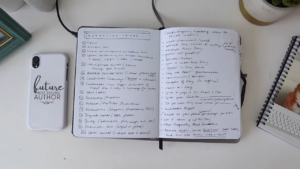It’s common for writers to experience periods where the words don’t flow as easily and inspiration feels sparse. This is a normal part of the creative process known as writer’s block. Rather than viewing it as a reflection of your abilities, understand that our motivation and productivity will naturally fluctuate at times.
A lack of new ideas may stem from not having the right stimulus, but can also be influenced by fear of failing expectations or harsh self-criticism.
Luckily, there are some ways to deal with this problem. We’ll share the most efficient solutions in the following sections.
1. Start Small – It’s Ok, You’ll Get There
When the empty page yawns vast before inspired thoughts, divide the task into small, digestible portions to avoid stagnation. Begin with but a brush stroke – a lone sentence, then another, gradually coloring the canvas.
Focusing section by section honors both your heart’s share and need for flow; eased pressure maintains momentum. Outlining guiding bones beforehand grants scaffold for patient fleshing, solid yet malleable framework easing what seeds sprout where.
Scattered blossoms thus bloom connected, one sparking the next naturally as a breeze spreads fragrance throughout the garden.
2. Set Realistic Goals
Setting achievable writing goals helps you make steady progress without burnout. Targets like writing for 30 minutes daily or 200 words per session allow you to build a sustainable pace. Meeting modest goals rewards your effort and keeps your motivation high. Larger ambitions can overwhelm if not broken into steps.
Focus first on consistency through doable goals within your schedule and capacity. Small wins will feed bigger accomplishments over the long run. Measuring your output keeps you accountable while allowing natural fluctuations. If obstacles arise, adjust goals compassionately rather than feeling failure.
3. Create a Routine, It’s Very Important
Finding a productive writing schedule is key. Experiment with morning or evening sessions to see when you feel most focused. Once you identify your optimal time, commit to writing then each day for consistency.
It’s also important to set up a distraction-free workspace that puts you in the right mindset. Somewhere you can easily lose track of time while drafting.
4. Change Your Environment
Sometimes getting your ideas flowing simply means exploring new creative territory. Opt to pen your next passage from an unfamiliar room in your home or try local cafes and parks. Novel visuals and sounds can stir fresh perspectives worth mining for your work.
While certain souls thrive best alone with pensieve and paper, others flourish off passing people-watching. If solitude fuels your flame, hunt peaceful nooks letting imagination roam untethered. But bustling locales equally spark creativity for writers energized outside by lively atmosphere.
5. Use Writing Prompts for Starters
Prompts can help when you’re stuck for ideas. Look up prompt collections or books online/in stores. A prompt gives you something simple to start with so you don’t have to think of a topic from scratch.
You can find prompts tailored for specific genres like mystery or sci-fi if that’s your interest. Working with prompts is useful for practicing writing even if you’re not feeling inspired.
6. Try Free Writing

Set a timer for 10-20 minutes and write continuously without worrying about grammar or coherence. This exercise can unearth new ideas and themes. It’s a technique that prioritizes flow over the accuracy, helping to silence the inner critic that often hampers new writers.
Free writing can also be a therapeutic tool, allowing you to express thoughts and emotions freely. Over time, patterns and ideas often emerge that can be developed into more structured works.
7. Don’t Just Write, Read Widely
Reading exposes writers to different styles, ideas, and vocabularies, which can spark creativity. Diverse reading materials—from novels and poetry to newspapers and blogs—can provide a rich source of inspiration and learning.
Try to step outside your comfort zone and read genres or authors you wouldn’t normally consider. This broadens your understanding of different narrative structures and writing styles, which can significantly enrich your own writing.
8. Engage with Other Writers

Joining writing groups or online forums allows for sharing challenges and solutions with peers, providing support and motivation. These communities often offer feedback on your work, which can be invaluable for improvement.
Participation in such groups also helps in understanding diverse perspectives and techniques that others employ in their writing. Additionally, seeing others struggle and succeed can be incredibly motivating and reassuring that difficulties in writing are universal, not personal.
9. Take Breaks – Yes, You Need It!
Regardless of how good you think you’re feeling, regular breaks refresh the mind and prevent burnout. Stepping away from writing might seem counterintuitive but often helps clarify thoughts and ideas. Use breaks as a time to engage in other creative activities like drawing or playing music, which can inspire new insights.
Breaks also prevent physical strain from sitting in one position too long, which can keep your body healthy and your mind sharp. Remember, rest is not wasted time but a crucial element of the creative process.
10. Reflect on Your Successes, That’s Quite Something!

Reflect on what worked in the past and try to replicate these conditions. Keeping a log of writing achievements can boost confidence. This log can serve as a personal reminder of your growth and as a tool to motivate you during tougher times.
Celebrate every small victory, whether it’s writing more than you planned, receiving positive feedback, or simply overcoming a difficult piece. Acknowledging your successes reinforces your identity as a writer and builds the resilience needed to continue.
In summary
With patience and persistence, these strategies can help transform your writing into a more enjoyable and productive experience. Keep writing, keep experimenting, and most importantly, keep moving forward.
I’m Anastasia, and I’ve just wrapped up my postgraduate studies in literature. I absolutely love writing books. It’s my way of weaving new worlds and breathing life into the characters that keep me up at night. Literature isn’t just a field of study for me; it’s a canvas where I paint with words. Through my writing, I hope to connect with others who share my love for storytelling and to contribute something meaningful to the literary world.








